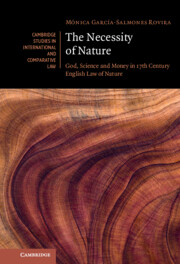Book contents
- The Necessity of Nature
- Cambridge Studies in International and Comparative Law
- The Necessity of Nature
- Copyright page
- Contents
- Figure
- Preface
- Introduction
- 1 A Christian Science
- 2 Hobbes’s Doctrine of Necessity
- 3 Necessities, Natural Rights and Sovereignty in Leviathan
- 4 Reformers on the Necessary Knowledge
- 5 Necessity, Free Will and Conscience
- 6 The Grand Business of Nature
- 7 Robert Boyle, the Empire over Nature
- 8 Locke’s Early Writings
- 9 Medicine, Oeconomy and Needs
- 10 Money and the Doctrine of Necessities
- 11 The Scientification of Money
- 12 The Doctrine of Necessities and the (Public) Good
- Conclusions
- Index
- Cambridge Studies in International and Comparative Law
12 - The Doctrine of Necessities and the (Public) Good
Published online by Cambridge University Press: 16 February 2023
- The Necessity of Nature
- Cambridge Studies in International and Comparative Law
- The Necessity of Nature
- Copyright page
- Contents
- Figure
- Preface
- Introduction
- 1 A Christian Science
- 2 Hobbes’s Doctrine of Necessity
- 3 Necessities, Natural Rights and Sovereignty in Leviathan
- 4 Reformers on the Necessary Knowledge
- 5 Necessity, Free Will and Conscience
- 6 The Grand Business of Nature
- 7 Robert Boyle, the Empire over Nature
- 8 Locke’s Early Writings
- 9 Medicine, Oeconomy and Needs
- 10 Money and the Doctrine of Necessities
- 11 The Scientification of Money
- 12 The Doctrine of Necessities and the (Public) Good
- Conclusions
- Index
- Cambridge Studies in International and Comparative Law
Summary
The goal of the final chapter is to examine the central role of necessities in the epistemological, moral and political theory of An Essay of Human Understanding and of the Two Treatises of Government. A study of the former shows Locke’s preoccupation with classical moral questions such as happiness and the ‘good objects of desires’ and how necessities helped him to strike a balance between tradition and the new science. As a rule of thumb of proper conduct, knowledge of necessities leads to the preservation of life, a human being’s most important duty to God. His doctrine of necessities is what made it possible for Locke to develop the theory of the public good with which, it is argued, he attempted to defeat the egoist theory of self-interest. Examination of his conception of property and money through the lens of human necessities shows a certain ambiguity in Locke’s normative ideals. Nevertheless, my conclusion is that above other considerations underlying the capital-oriented ideals of the period, the last word of Locke’s political theory is the public good represented by preservation and convenience for the commonwealth and, when possible, for the whole of humanity.
Keywords
- Type
- Chapter
- Information
- The Necessity of NatureGod, Science and Money in 17th Century English Law of Nature, pp. 390 - 418Publisher: Cambridge University PressPrint publication year: 2023

